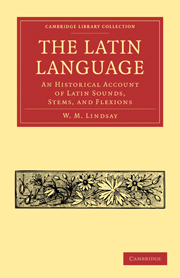Book contents
- Frontmatter
- PREFACE
- Contents
- LIST OF ABBREVIATIONS
- CHAPTER I THE ALPHABET
- CHAPTER II PRONUNCIATION
- CHAPTER III ACCENTUATION
- CHAPTER IV THE LATIN REPRESENTATIVES OF THE INDO-EUROPEAN SOUNDS
- CHAPTER V FORMATION OF NOUN AND ADJECTIVE STEMS
- CHAPTER VI DECLENSION OF NOUNS AND ADJECTIVES. COMPARISON OF ADJECTIVES. NUMERALS
- CHAPTER VII THE PRONOUNS
- CHAPTER VIII THE VERB
- CHAPTER IX ADVERBS AND PREPOSITIONS
- CHAPTER X CONJUNCTIONS AND INTERJECTIONS
- INDEX
- ADDENDA ET CORRIGENDA
CHAPTER IX - ADVERBS AND PREPOSITIONS
Published online by Cambridge University Press: 05 August 2011
- Frontmatter
- PREFACE
- Contents
- LIST OF ABBREVIATIONS
- CHAPTER I THE ALPHABET
- CHAPTER II PRONUNCIATION
- CHAPTER III ACCENTUATION
- CHAPTER IV THE LATIN REPRESENTATIVES OF THE INDO-EUROPEAN SOUNDS
- CHAPTER V FORMATION OF NOUN AND ADJECTIVE STEMS
- CHAPTER VI DECLENSION OF NOUNS AND ADJECTIVES. COMPARISON OF ADJECTIVES. NUMERALS
- CHAPTER VII THE PRONOUNS
- CHAPTER VIII THE VERB
- CHAPTER IX ADVERBS AND PREPOSITIONS
- CHAPTER X CONJUNCTIONS AND INTERJECTIONS
- INDEX
- ADDENDA ET CORRIGENDA
Summary
§ 1. ADVERBS. Latin Adverbs are for the most part cases of Nouns, Adjectives (or Participles), and Pronouns, the cases most frequently found being the Accusative (cf. O. Ind. náktam, ‘by night,’ satyám, ‘truly,’ Acc. Sg. Neut., pratarām Acc. Sg. Fem., Gk. πρότερον Acc. Sg. Neut., μακράν Acc. Sg. Fem., κρύφα Acc. Pl. Neut.), Ablative (cf. O. Ind. dūrāt, ‘afar’) [also Instrumental (?), cf. O. Ind. dívā, ‘by day,’ Gk. ἄλλη], and Locative (cf. O. Ind. dūrē, ‘afar,’ Gk. οἴκοι, ἀναιμωτεί, έκοντί), and often retain case-forms which have become obsolete in the ordinary declension. Thus, -im, the original form of the Acc. Sg. suffix of I-stems (ch. vi. § 29), which in classical Latin was replaced by the -em of Consonant-stems, e. g. partem from the stem parti-, like militem from the stem milit-, is retained in Adverbs like partim, and in the Adverbial Accusatives of Verbal Noun I-stems, e. g. raptim from the stem rapti- (class, raptiōn-, ch. v. § 42), sensim from the stem sensi- (class, sensiōn,-), uni-versim (Osc. úíníveresím) &c.; nox, an old equivalent of noctu, seems to be an early byform of noctis Gen.; -ē (older -ēd), the suffix by which Adverbs derived from Adjective O-stems are formed in the Italic languages, is an Abl. Sg. suffix (parallel with -ō, older -ōd, ch. vi. § 33), which has been reserved for Adverbs alone.
- Type
- Chapter
- Information
- The Latin LanguageAn Historical Account of Latin Sounds, Stems, and Flexions, pp. 548 - 595Publisher: Cambridge University PressPrint publication year: 2010First published in: 1894



